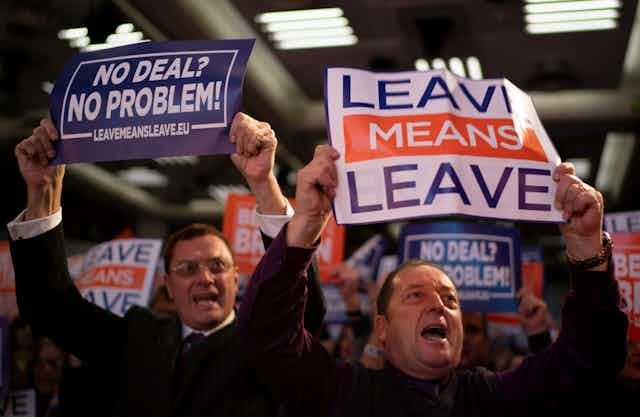“Hard Brexit”, “soft Brexit”, “Norway plus”, “Canada plus plus” – you could be forgiven for being confused about the options available for Britain as it leaves the EU. One phrase in particular, though, is worth investigating further: “a managed no-deal Brexit”. On the face of it, it seems a contradiction in terms. After all, isn’t no deal about the UK crashing out of the EU or going over a cliff edge? How could such a sudden and disastrous event be managed?
Technically, “no deal” refers to the UK leaving the EU on March 29 2019 without a withdrawal agreement in place. That, in practice, means no agreement on what to do about the border between Northern Ireland and Ireland, no agreement on how to settle the UK’s bill for money committed to the EU before the vote to leave, and no agreement on citizens’ rights.
A “managed no deal” is currently favoured by some more hardline Brexit supporters. They see it as circumventing the withdrawal agreement that Theresa May negotiated with the EU, which they see as unacceptable. The “managed” element is the hope that issues like aviation, border controls and security cooperation can all be sorted out by striking individual deals after leaving. Those advocating this approach see trade as the primary issue at stake in Brexit.
Ardent Brexit supporters clearly see a need to adopt the phrase and use it over and over at the moment, just as May is emphasising the dangers of no-deal. The attribute “managed”, it is suggested, makes all the difference between chaos and control. As in so much of the Brexit debate, language is being used for a partisan political agenda at this critical juncture.
The road to freedom or a road to nowhere?
One advocate for a managed no-deal Brexit is the international development secretary, Penny Mordaunt. She described it as providing “a smooth glidepath” to leaving without an agreement.
Mordaunt’s phrase is the latest addition to a metaphor that has shaped much of the discussion on Brexit. We have often heard that the UK, its people and government, are on a journey towards leaving the EU. As early as October 2016, The Economist magazine featured a cover with the headline “The road to Brexit” and a drawing of May and Boris Johnson driving the Great Britain car towards a landscape featuring forks in the road, loops, burning bridges, cliff edges and sunny uplands. More recently, the author JK Rowling likened Brexit to a ship, claiming that those “who plotted its course scramble for the lifeboats”.

Both The Economist and Rowling are sceptical about Brexit, to say the least. And herein lies the problem for Brexiters who want to use the metaphor: despite occasional references to Brexit as “the road to freedom”, the journey metaphor is more often associated with the idea that the UK is hurtling towards the abyss. Mordaunt’s aeronautic variation can be seen as an attempt to reclaim the journey metaphor for Brexit supporters. Whether she has succeeded is another matter.
There is more to the phrase “managed no deal” though. If we look back at the Leave and Remain campaigns, both consistently sought to evoke the emotions of voters. Leave aimed to trigger both negative and positive feelings – frustration with being restricted by the EU, fear of uncontrolled immigration, and pride in a “Global Britain”. The Remain campaign appealed overwhelmingly to fears about the UK’s economic future outside of the EU. Two-and-a-half years on, it is no deal that is being presented as a frightening prospect. And the way to overcome fear of what could happen is to control or manage future events.
The notion of control was central to the Leave campaign. After triggering fears about the perceived threat posed by immigrants, and frustration about a seeming lack of power as an EU member state, the same campaign provided the solution to such negative feelings: take back control of British laws, borders and money by leaving the EU. The idea of managing a no-deal scenario follows a similar pattern, except that the fears that need to be quelled in this case have been evoked by those rejecting a no-deal scenario.
In the public debate on Brexit, the phrase “no deal” is typically combined with speculation on how likely it is and, overwhelmingly, uttered alongside words like “prepare” and “preparation”. “Managing” a no-deal scenario is one step up from “preparing” for it: not only has every precaution been taken, but the event is actively shaped. It’s more than slightly reminiscent of that other key buzzword of the Leave campaign: “Control.”
In an age where politicians and pressure groups alike act on the advice of communications consultants, it seems that a new term is introduced into the debate every few weeks and repeated ad infinitum, if not ad nauseam. “People’s vote”, “leave means leave”, “cliff-edge Brexit”, “managed no deal” – shout the phrase of the day loud enough and often enough and voters might just remember it at the ballot box. Rarely is there any space or inclination to look at what these slogans actually entail.
Like all these phrases, “a managed no deal” is not just meaningless spin. It may be a contradiction in terms, but it still has specific functions in the public discourse on Brexit. It serves to allay fears, allows for a positive variation on the journey metaphor and introduces a new option into the debate. Whether that option is realistic, however, is another question.

